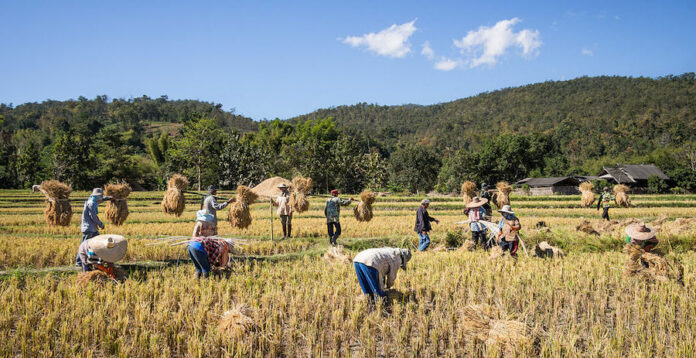![TAKEAWAY [CC BY-SA 4.0] / WIKIMEDIA COMMONS](https://theaggie.org/wp-content/uploads/2016/11/indus_op.jpg)
 Embattled agriculture industry generates 80 percent of food sales, yet is spurned
Embattled agriculture industry generates 80 percent of food sales, yet is spurned
In a world where the global population is rapidly growing, humanity needs to start having a serious conversation about where its food comes from. It’s no longer a battle of organic and non-GMO producers versus conventional producers — it’s a matter of necessity. Large producers generate over 80 percent of food sales in the United States, yet they only make up a small fraction of all farms — about 3 percent.
Some might assume that large industrial farms are corporate-owned, but in reality, 97 percent are actually family-owned. As global consumption of grains and meat grows, productivity must also increase. Agriculture must evolve and industrialize in order to meet the needs of the nine billion people expected to populate Earth by 2050. Modern agriculture now utilizes new technology during production in order to grow food efficiently and sustainably. These methods help reduce soil erosion, better moderate planting and significantly reduce the greenhouse gas emissions associated with plant and livestock agriculture.
With the advent of this new technology, livestock and crop production more than doubled its output between 1948 and 1994. Additionally, the United Nations said that 70 percent of human kind’s future food must come from the current technologies we have today.
This food has to be consumer-friendly, environmentally-friendly and economically-friendly. With efficiency-enhancing technology helping reduce land and water usage and manure production across the United States, farming is becoming more sustainable every day. And based on a UN Food and Agriculture Organization projection, farming in 2050 will only occupy about 1 percent more land than was used in 2008.
Industrial farms have been able to overcome challenges to sustainability because they use new technologies emerging in the agricultural sector and focus on providing safe and healthy food for all. Because of industrial farms, people are able to eat more high-quality food, allowing for steady diet improvements across the globe. And in order to be able to feed the growing population, industrial farms are becoming more of a necessity.
However, some people think that these new technologies will destroy the environment, and so would consequently prefer to eat organically-grown food from small farms. A survey performed in 2010 by the International Food Information Council actually found that 98 percent of people who answered the survey were not concerned about food safety when related to the use of biotechnology, and 93 percent do not purchase organic food all or most of the time. It seems like the majority of people do not consider industrial farming a problem.
Food remains a very controversial topic, yet access to it is one of our most basic human needs. Instead of picketing against large farms, we should be looking into how we might help save the planet ourselves.
Millions of people go hungry every day, and the people who are against industrial farming are the ones least likely to realize that mass-producing safe, affordable and healthy food is a necessity. This will be one of our most important battles in the coming years. We cannot, as national and international populations, stand divided.
Farming is becoming more efficient and sustainable, and not because farmers want to cut corners and produce more food for personal profits — it’s because people are hungry and need to eat. Industrial farming is on the forefront of food production, helping bring cheap, healthy and consumer-friendly food to grocery stores everywhere.
Written by: Alice Rocha — asrocha@ucdavis.edu
Disclaimer: The views and opinions expressed by individual columnists belong to the columnists alone and do not necessarily indicate the views and opinions held by The California Aggie.





